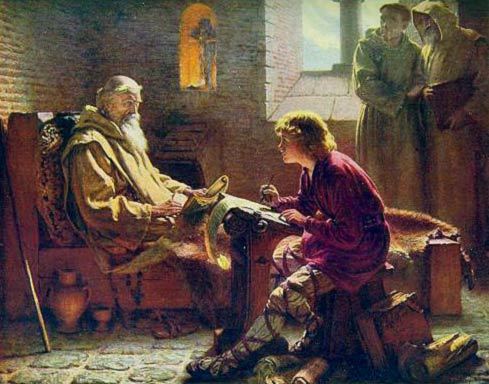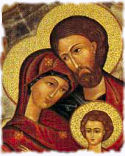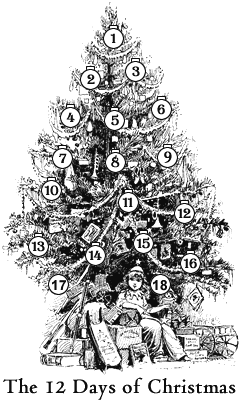 |
| Venerable Bede- James Doyle Penrose, Bede on his deathbed completing his translation of St John's Gospel to the young scribe Wilburt (Wilbur), 1902. |
31 DECEMBER
Year
1
First Reading
Second Reading
Colossians 2:4-15
Responsory Col 2:9-10.12
The
fullness of divinity lives in Christ's humanity; + he is the head of every
power and authority.
V.
In baptism we were buried with Christ, and in baptism we have risen to a new
life with him through our faith in the power of God. + He is the ...
From
a homily by Saint Bede of England
(Hom. 1,6: CCL. 122,42-44)
(Hom. 1,6: CCL. 122,42-44)
The people who walked in darkness have seen a great light
There were
shepherds nearby, keeping watch over
their flock by night. And an angel of the Lord appeared unto them, and the
glory of God shone round about them. When the true light of the world was born into the world, it was surely fitting
for the herald of his birth to fill even men's bodily eyes with the wonder of
heavenly light. The prophet says of
his birth: Light dawned in the
darkness for the upright of heart, and as if we had asked him what light he meant he immediately adds: the
Lord uilio is gracious, merciful, and just. Since, then, the gracious and just
Lord, creator, and Redeemer of the human race, deigned to illuminate the world
with the glory of his marvellous birth, it was altogether fitting for the glory
of that wonderful light to fill the
whole countryside around the place of his birth.
For today, in
the city of David, a saviour has been
born for us: he is Christ the Lord. Since the light of life has dawned for us who lived in the shadow of death,
it is fitting that his herald sings: for (saviour has been born for us to make
us always remember the night of blindness we used to live in, and urge us, now
that the day of eternal salvation has come, to give up deeds done only in the
dark, and live as children of the light.
Let us
listen to the angel who appeared in
glory speaking to the shepherds: Do not be afraid; I bring you good news, news
of a great joy that will come to all people. Truly it was a great joy, for it
was a heavenly joy, a joy no sadness could interrupt or disturb, a joy known
only by the elect. That will come to all people: not all the Jewish people, or
all the Gentile people, but all people from among the Jews, or the Gentiles
spread throughout the world, who are united by the same acknowledgement of
Christ, and are called Christians because they have the same understanding of
the mysteries of Christ. It is of these people that the prophet says: The
people who walked in darkness have seen a great light.
And this will be a sign for you: you will find a baby wrapped in swaddling clothes and lying in a manger. We ought always to
remember this sign of our Saviour’s birth in a human body, and learn from it to
thank him for his kindness by living a good life. For he chose to become weak
like us, not recoiling even from the condition of human poverty. That he became
weak is shown by the fact that he was a baby wrapped in swaddling clothes, and
that he was poor by his being found not in a crib but in a manger. Let us then
sing of the Lord's mercies forever, since he did not refuse to share our mean
estate and our mortality so that we might live in eternal bliss.
Suddenly the
angel who announced the Lord's nativity
was joined by a great throng of the heavenly host who had come to pay devout
homage to the newborn Lord, and to celebrate his present appearance on earth
with the hymns of praise they had always sung to his glory in heaven. The
praise the citizens of heaven thus teaches us how to celebrate the joy of this
most sacred solemnity, and what songs of praise we should sing to the Word of
God for becoming man and dwelling among to raise us up to the vision of his
glory and give us a share in his own fullness of grace and truth.
Responsory
Light from light has appeared to
us this day; come, all you peoples, and adore the Lord, P for today a great light has shone upon the earth.
V.
Everlasting joy has come down to us from heaven. + For today a ...





.JPG)



crop.jpg)

 Today is the feast day of the Holy Family, but also every family's feast day, since the Holy Family is the patron and model of all Christian families. Today should be a huge family feast, since it is devoted entirely to the Holy Family as a model for the Christian family life. As Rev. Edward Sutfin states:
Today is the feast day of the Holy Family, but also every family's feast day, since the Holy Family is the patron and model of all Christian families. Today should be a huge family feast, since it is devoted entirely to the Holy Family as a model for the Christian family life. As Rev. Edward Sutfin states:

